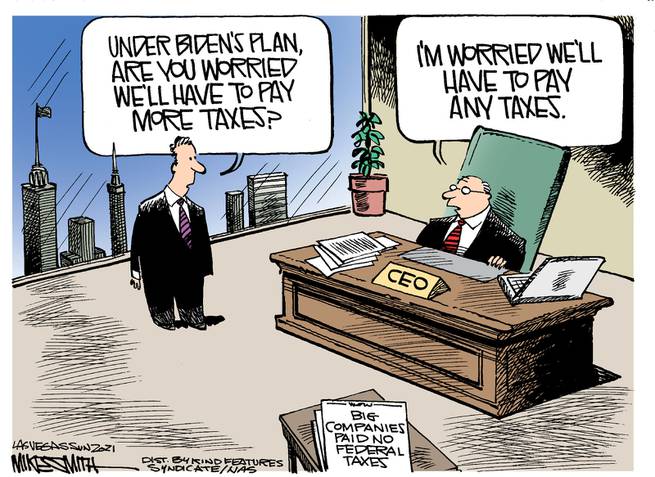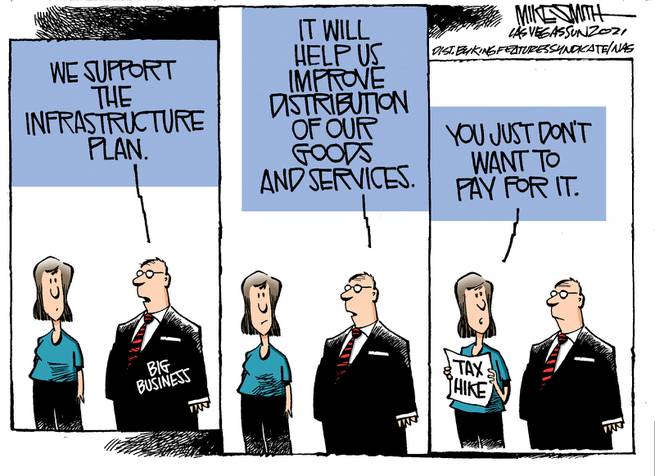Political Economy category archive
Inflated Fears 0
Professor Richard Wolff joins Thom to talk about the recent inflation numbers.
A little–I emphasize little–inflation is not necessarily a bad thing. I think that a major contributor to the emotional panic we see today at the least little bit of inflation is a legacy of the OPEC fuel embargo of the 1970s. Fuel prices rose starkly (remember gas lines and odd-even rationing?), spurring double-digit inflation rates across the economy.
Part of the legacy of that experience, in my view, is an unreasoning fear of even the smallest hint of inflation, leading to gnashing of teeth, wringing of hands, and stupiding of policy.
It’s Not the Labor that’s Short. It’s the Paychecks. 0
At the Des Moines Register, Maria Reppas remembers her time working in a restaurant and makes the case that small business owners (such as restaurants) are grousing about the wrong shortage. A snippet (emphasis added):
Instead of a mythical labor shortage, the United States has a livable wage shortage.
Decoding De Code 0
Jill Richardson translates:
They mean the freedom of one individual to harm or gain unearned advantage over another (for example, by Hobby Lobby refusing to cover birth control for employees) or preserving the freedom to benefit from society without giving back (for example, large corporations that benefit from taxpayer-funded services, but pay little to nothing in taxes).
Follow the link for the rest.
Exceptions 0
Michael in Norfolk catalogs the contrasts. A snippet:
The Mess with Texas, Electric Boogaloo Bamboozle Dept.
0
Paul Krugman explains the flawed reasoning behind the failure of the electricity industry in Texas. A snippet:
In fact, some people see nothing wrong with what happened in Texas in the past week. William Hogan, the Harvard professor widely considered the architect of the Texas system, asserted that drastic price increases, while “not convenient,” were how the system was supposed to work.
But kilowatt-hours aren’t avocados, and there are at least three big reasons why pretending that they are is a recipe for disaster.
Follow the link for those three big reassons.
The Courage of Their Conniptions 0
Gwynne Dyer is an optimist thinks that there’s hope for the Republican Party.
Here’s a bit of the straw at which she grasps. Follow the link for the rest of the broom.
The following day, in an open vote on whether Rep. Marjorie Taylor Greene, a fanatical Trump loyalist, should keep her seat on several congressional committees despite her ugly and certifiably crazy views, the very same Republican members of the House voted to keep her in place by 199 to 11.
(snip)
The Republican members of Congress may be weak and cowardly, but most are not wicked. In an open vote, they felt they had to back Greene, because otherwise Trump’s loyalists back in their home districts would ensure that they never got elected again. But they’d love to dump him if they could do it safely.
The Stock Market Is Not the Economy, Crooked Wheel Dept. 0
Drew Magary took a flyer on the Robinhood app and ended up with very little john, which led him to form a theory about how the stock market works is worked. (Warning: Language.)
Individual stocks may go way up or way down, but the market itself only knows one trajectory. They’ll never let the whole market sink even if certain stocks eat curb. When the pandemic hit, what was the first thing legislators worried about? It wasn’t you. It wasn’t your favorite mom-and-pop pad Thai joint. It was the market. Who’d the legislators bail out in 2008 when the banks collapsed? Not you. The banks. Why? To keep the market up. They’ll never let it fail. All of their interests, regardless of party, coalesce within it. Hence, the average American’s best way to survive the vagaries of the market is to invest in ALL the corruption, not in bits and pieces of it.
That means index funds.
Rosy-Colored Glasses 0
Paul Krugman is an optimist.
Even though what he says is true, the falsehoods have become too deeply ingrained to be dislodged by something as trivial as evidence.
















